Robots 'may fill farm worker shortage'published at 17:06 GMT 1 November 2016
A technology expert tells peers robotic tractors could help fill any fall in farm worker numbers after Brexit.
Read MoreHigh Court challenge to Brexit process succeeds
Ruling says MPs, not just PM, must approve Article 50 process
Government to appeal against decision
Bank of England raises 2017 UK growth forecast
Jackie Storer and Alex Hunt
A technology expert tells peers robotic tractors could help fill any fall in farm worker numbers after Brexit.
Read MoreSharia councils
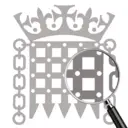 Select Committee
Select Committee
Parliament
Yvette Cooper asks whether the two lawyers before the committee believe that Sharia councils give "equal weight to the testimony of women and men".
Miranda Fisher says each party should have "independent legal advice" and be "entering into the process consensually".
She concedes that discrimination is "a possibility" and says it is important that people have "an English family law fallback".
However, she adds that she doesn't want to "downgrade" the role of religious councils and the use of them is "a matter of personal choice".
Ismet Rawat says "there isn't any empirical data" that there is widespread discrimination, just "anecdotal evidence that may not have been fully tested".
Sharia councils
 Select Committee
Select Committee
Parliament
Ismet Rawat, president of the Association of Muslim Lawyers, says the "right-wing press" tries to create the impression that Sharia councils are trying to create a parallel legal system.
"They're not," she insists.
Labour MP Chuka Umunna asks her fellow lawyer, Miranda Fisher, whether she thinks Sharia councils constitute "a parallel system of justice".
"I would find it difficult to comment on that question," Ms Fisher says, though she adds: "They are playing a role in terms of granting religious divorces."
Ms Rawat says most Muslim men and women would see Sharia "as a way of accessing religious justice. They wouldn't see it as the law of the land".
Sharia councils
 Select Committee
Select Committee
Parliament
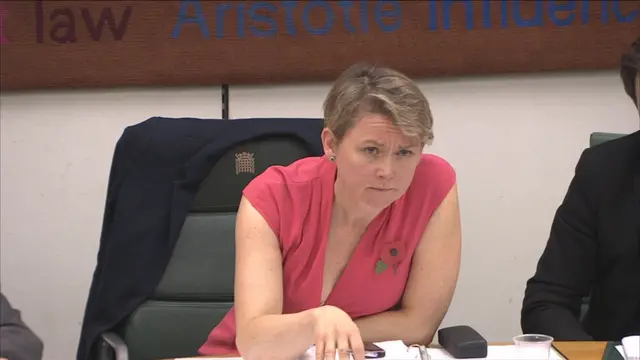
Home Affairs Committee chairwoman Yvette Cooper asks lawyer Ismet Rawat if she supports an ombudsman for those dissatisfied with the service from a Sharia council.
Ms Rawat says "an independent body" should provide such a service but has doubts that there should be "a statutory basis" for an ombudsman.
She says she "cannot gauge" whether perception that there is "more of an issue" with Sharia councils than those of other faith groups is accurate.
Ms Rawat proposes an "overarching ombudsman" which could be provided to ensure "a standardised framework across all faith groups".
 Eleanor Garnier
Eleanor Garnier
Political Correspondent
The prime minister's spokeswoman was asked about comments made by the chancellor this morning that the UK must be able to retaliate in kind against cyber-attacks and that hostile "foreign actors" were developing techniques that threaten the country's electrical grid and airports.
The prime minister's spokeswoman said "what the chancellor has been setting out today is about the emerging threats that we face as a nation. That as technology is developing we are seeing differing threats and specifically talking about what can happen in the cyber space. It's right and prudent of the government to be looking at how do we best protect ourselves as a county from that, how do we support businesses and individuals so they are protected from that so it's right that we look at the range of action we can take."
EU Select Committee
 Select Committee
Select Committee
Parliament
Department for Exiting the EU minister David Jones rejected suggestions that the UK might learn from the Canadian experience of negotiating the Ceta free trade deal with the European Union, saying that circumstances were different as Canada is not an EU member state.
Mr Jones said: "Canada was attempting to negotiate additional market access, whereas of course we are a member state. We thereby have whole market access and our position is wholly different from Canada."
Press accountability campaign group Hacked Off has responded to the Culture Secretary's announcement on a Leveson Part 2 consultation.
Hacked Off joint executive director and former Lib Dem MP Evan Harris said: “Many of the victims of press abuse were thrust into the media spotlight after tragic circumstances, and gave evidence over 18 months to Lord Leveson reliving the traumas they suffered. Today’s announcement of a further consultation from the Secretary of State is a disgraceful attempt to force them to go through that all over again.
“This 'consultation' is no more than an attempt by the Government to re-run the Leveson Inquiry, but with a conflicted Government Minister replacing an independent Judge. That is the last way decisions over press regulation should be taken.”
Asked about the culture secretary's announcement on a consultation over continuing the Leveson Inquiry, the Prime Minister's Spokeswoman said: "The government's view here and the PM's approach is that we need to strike the right balance between a healthy vibrant press and the freedom of the individual.
"It is sensible given where we are now and with the time that has elapsed since Leveson I and the actions taken - there's been a whole range of steps that have been taken since - to now seek views on how to proceed."
Also in the running are Suzanne Evans, John Rees-Evans and Peter Whittle.
Allow X content?
This article contains content provided by X. We ask for your permission before anything is loaded, as they may be using cookies and other technologies. You may want to read X’s cookie policy, external and privacy policy, external before accepting. To view this content choose ‘accept and continue’.
Pension Schemes Bill
 House of Lords
House of Lords
Parliament
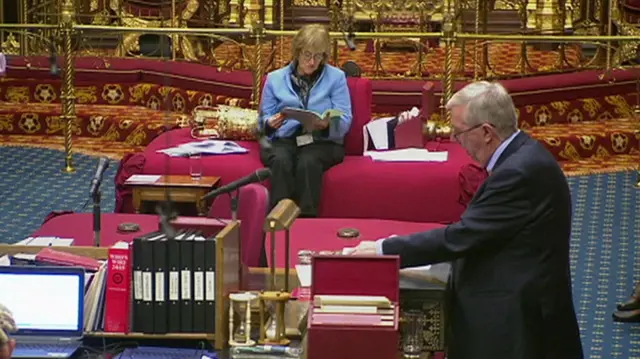
Speaking for the opposition Lord McKenzie of Luton welcomes the bill as a "necessary" one but suggests it has been "too long in the coming".
He tells peers that recent events such as the collapse of BHS and the Waspi women have damaged confidence in the savings markets.
Such incidents, he says, emphasise the need to make progress - particularly improving the powers of the pensions regulator.
Sharia councils
 Select Committee
Select Committee
Parliament
Miranda Fisher, a family law specialist, tells the Home Affairs Committee: "I do not know of a reported family law case that refers to a Sharia council decision."
However, religious matters do sometimes arise in family law cases, she adds, an example being that "we do not recognise religious divorce in this country".
She thinks cases in which a decree absolute, finalising a divorce, is held up until the husband agrees to it, could be a potential area for reform.
Investigatory Powers Bill
 House of Commons
House of Commons
Parliament
MPs have voted to reject the Lords 'Leveson amendment' to the Investigatory Powers Bill by 298 to 261.
 House of Lords
House of Lords
Parliament

Peers now move to the main business of the day - the Pension Schemes Bill.
The government describes the aim of the legislation as protecting savers and maintain confidence in pension savings.
One of the key components of the bill is to ensure that those saving into a Master Trust scheme will be protected.
Master Trust schemes are a form of multi-employer occupational pension scheme which enable employers to fulfill their obligations to their workers without having to set up their own pension scheme.
The Master Trust market was developed in response to the Pensions Act 2008 which made it compulsory for employers to automatically enrol eligible workers into pension schemes.
EU Select Committee
 Select Committee
Select Committee
Parliament
Asked about the close relationship between the UK and Republic of Ireland, Department for Exiting the EU minister David Jones has told the EU select committee that the residency rights of Irish citizens in the UK after Brexit will be a "high priority" for the government.
Shortly afterward, the division bell calls the minister back to the Commons for a vote on the Investigatory Powers Bill.
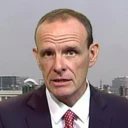 Norman Smith
Norman Smith
Assistant political editor
The government is to "take stock" over whether to proceed with key elements of the Leveson inquiry into phone hacking.
The Culture Secretary Karen Bradley announced there would now be a consultation over whether to continue with the second part of the Leveson inquiry into ties between the press and police over phone hacking.
She cited the cost of the Leveson inquiry (£47 million) and whether it was in the public interest to proceed with the second stage.
The consultation will also examine the role of the planned independent press regulator proposed by Leveson and its power to impose libel costs on newspapers.
Most newspapers have refused to sign up to this body - because they believe it threatens the freedom of the press and amounts to "state regulation."
The Culture Secretary Karen Bradley said only around 50 newspapers had agreed to register with Impress.
However more than two and half thousand organisations have backed a rival, newspaper supported regulator called IPSO.
Labour's Tom Watson said Leveson had been "discussed and debated long enough."
He questioned whether the government's decision followed a meeting between Theresa May and Rupert Murdoch in New York.
He also suggested the government was seeking to "cover up the cover up" over the role of the police and press in phone hacking.
Investigatory Powers Bill
 House of Commons
House of Commons
Parliament
Ben Wallace closes the debate by saying the bill is "not something to take lightly" and the legislation is needed because current powers expire on 31 December this year.
He says MPs are "playing politics" today by adding unrelated issues to a serious bill and running a risk of allowing the powers to expire and helping killers and terrorists escape detection.
He asks MPs to vote to disagree with the Lords amendment.
The UK faces a "Herculean task" to negotiate new trade deals with other countries when it leaves the EU, a Holyrood committee is told.
Read MoreSharia councils
 Select Committee
Select Committee
Parliament
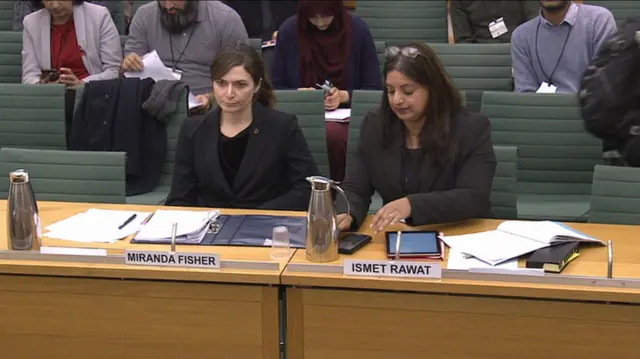
The next witnesses are two lawyers: Miranda Fisher, a partner in the firm Charles Russell Speechlys, and Ismet Rawat, president of the Association of Muslim Lawyers.
Ms Rawat says that a woman petitioning for divorce "doesn't necessarily have to go in front of a panel of men". She says she has "used the service personally" and assisted others.
Reasons for a woman to initiate a Khul'a divorce include "lack of financial support, abusive behaviour, controlling behaviour" or "when the husband is not providing conjugal rites", Ms Rawat tells MPs.
Orgreave question
 House of Lords
House of Lords
Parliament
Labour spokesperson Lord Rosser describes the decision not to hold an inquiry as a "sorry" one. He notes that the prime minister pledged to fight injustice - "apparently former mining communities, for one, are not covered".
Conservative Lord Tebbit, who was trade secretary during the 1984 miners' strikes, argues that an inquiry would do nothing more than "than enrich lawyers with fat fees".
Former Labour leader Lord Kinnock says the "justified sense of injustice" felt by coalfield communities will be deepened by the refusal to grant an inquiry especially, he says, in the light of claims that "politicised policing and tampering of evidence" took place.
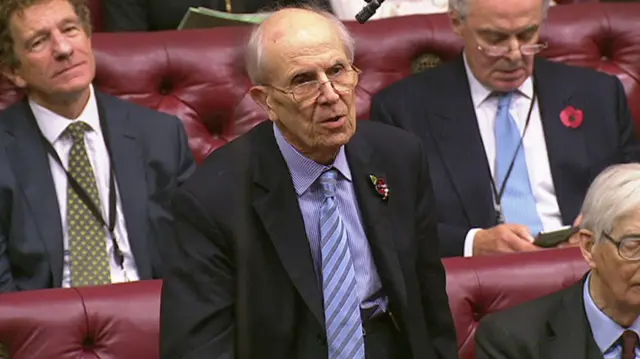
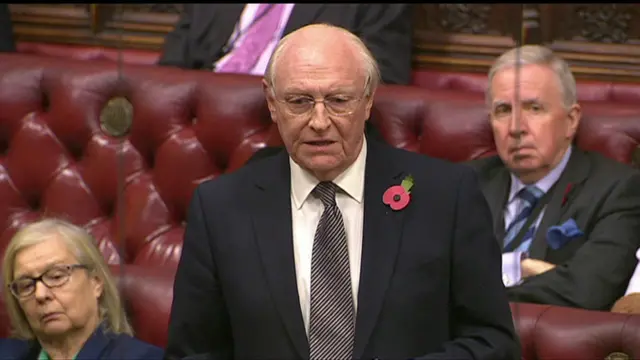
Investigatory Powers Bill
 House of Commons
House of Commons
Parliament
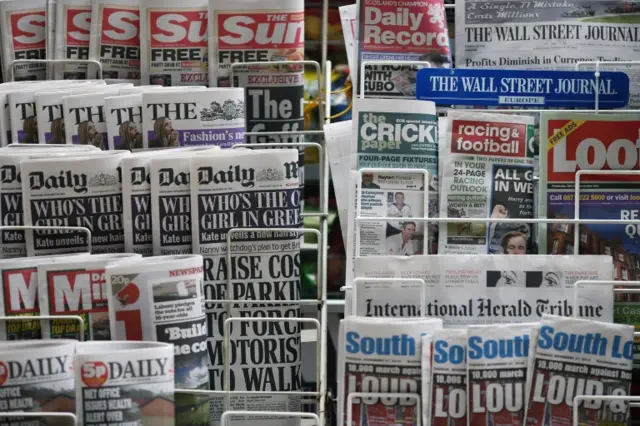 Image source, Getty Images
Image source, Getty ImagesThe amendment to the Investigatory Powers Bill that's causing so much disagreement in the House of Commons today was introduced by crossbench peer Baroness Hollins in the House of Lords.
The amendment would require newspaper and media groups to pay the costs of claimants pursuing damages for phone hacking through the courts, if they're not a member of an officially recognised press regulator.
There is currently one press regulator recognised by the government's Press Recognition Panel, called Impress, who have only signed up a few minor and local publications so far., external
Most major newspaper groups are signed up with IPSO, a regulator that has not sought to be officially recognised.
The provisions being debated already exist on the statute book, in Section 40 of the Crime and Courts Act 2013 but can only be triggered by the Secretary of State for Culture, Media and Sport.
To date, this has not been done.